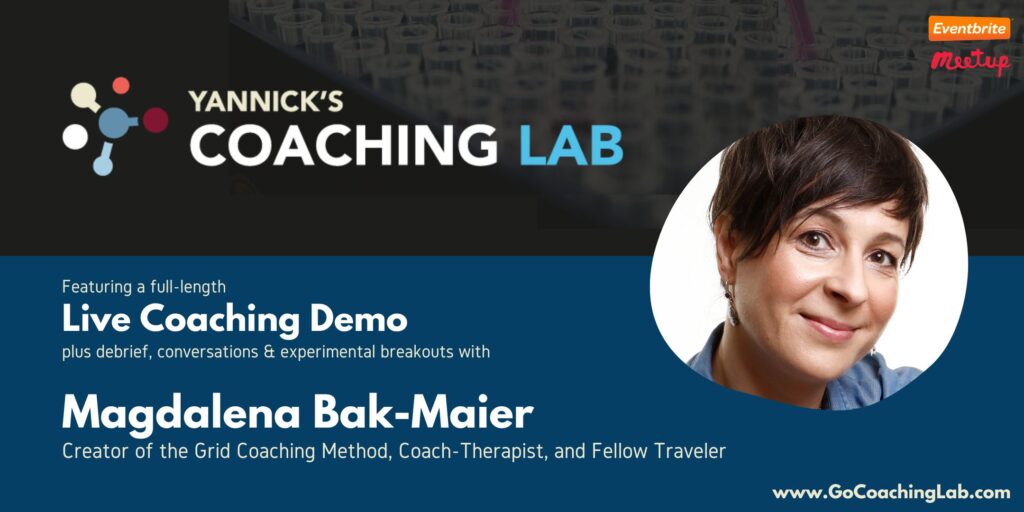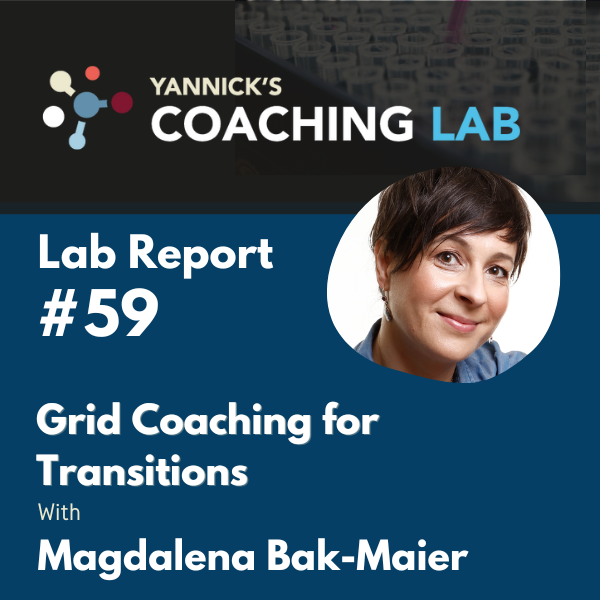
Yannick’s Coaching Lab features guest coaches from a broad variety of approaches, who showcase how they work as part of a live 45min coaching session, followed by reflections and Q&A with the audience.
Curious to know what this session was like? Have a peek at the Lab Report below or consider VIP membership to access the full recording of this and many more exciting sessions.
Yannick’s Coaching Lab #59 — Magdalena Bak-Maier
Lab Report by Natalie Fraser
Pre-Session Summary
Magdalena’s client is seeking balance as she’s facing several significant transitions. She has been living in the UAE working in various educational roles for 11 years, however, over the past couple of years has been edging out of the classroom towards psychology and wellbeing. Following marriage and buying a house back home in Ireland last year, Magdalena’s client is about to experience a huge life transition of changing location and career. Magdalena’s client feels there is momentum, and appreciated the space to explore what this momentum and change is flowing towards within the context of her ‘3 B words’: balance, belief, and boundaries.
Session Summary
Session Hopes Magdalena invited her client to share what she’d like to explore in today’s session, which Magdalena summarized in brief points and then asked her client to more specifically consider what she hopes to gain from this 40 minute session. Balance, belief and boundaries for self and goals were intentions set for this session.
Magdalena reflected to her client “I feel intrigued by your critic” and asked what her relationship was it. The client shared they’d done a lot of work with the critic, which was now more of a saboteur. The session gave space to explore more deeply the nature and experience of this saboteur. At times, Magdalena asked her client to close her eyes and repeat herself to really hear herself.
Role play – Describing the session as a shared learning and experimenting space, Magdalena played the role of her client’s saboteur. This exercise was begun by Magdalena asking for lines and tone guidance to take on the role. Having played the saboteur and explored together what this brought up for her client, Magdalena then took on the role of an extremely supportive person.
Grid Framework Magdalena invited her client to take a piece of paper and marker to draw a grid, whilst also sharing her screen and using an interactive whiteboard. She briefly introduced the model, explaining that to be well we need to meet needs in all four arenas, and how these four influence each other: Personal Life, work, self care, and career.
The grid was used by Magdalena and her client to consider her client’s experiences and upcoming transitions, making use of the client’s three ‘B’ words from the start: balance, belief, and boundaries. Moving the client through the difference arenas of the grid moved the client into different energetic and cognizant spaces.
Key Insights
Magdalena developed the ‘Grid’ methodology based on ideas of interconnected mind, body, and spirit as well as IFS, cognitive, neuroscientific influences. It is a very simple framework which involves connecting clients to their embodiment with a focus on their careers. The aim is to always be in balance between all four arenas. The grid is useful for accountability and creativity.
Magdalena was grateful that her client was trusting and willing to be spontaneous, and considered that in hindsight she might have contracted and explained her processes more.
Magdalena acting back the words of her saboteur felt unknown and unusual while it was happening, however, embracing it and seeing where it took them led her to valuable insights.
Throughout the session, Magdalena invited her client to connect with her energy and calm her headspace. Her client found these energetic connections very helpful – taking her out of her head and into her body.
Magdalena is an advocate for people prioritizing feeling the process over following the rulebook. This includes many areas of coaching, including the coach being more directive.
Magdalena pays attention to the moment and the session goal when deciding what interventions to use. For example, at times it can be helpful to pick up on when they are leaving the session (e.g. eyes darting) whilst at other times this may be unhelpful and disturb their process.
Magdalena recognizes how quickly our thought processes are, including this client, and felt it was important to slow her down. It felt quite uncomfortable for her client to repeat it, allowing her to really hear what her quick thoughts come up with. Magdalena also reflected that staying with speed could have been an important intervention.

